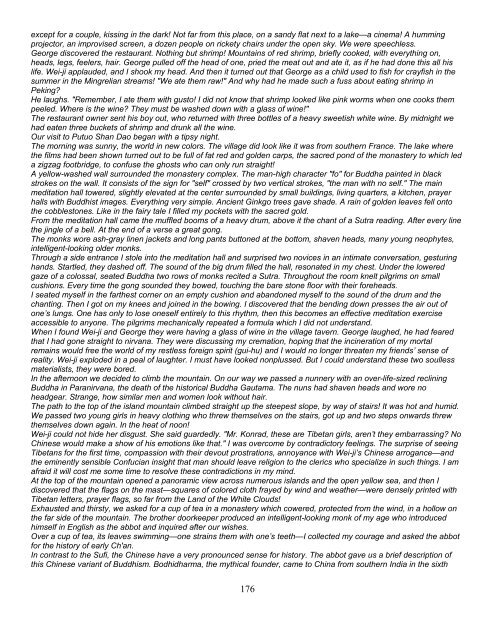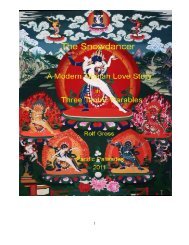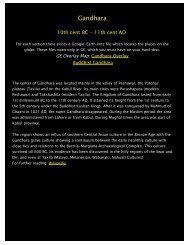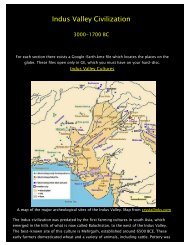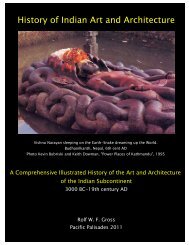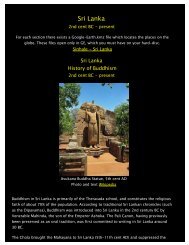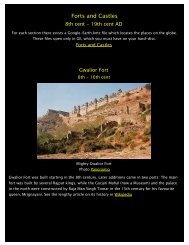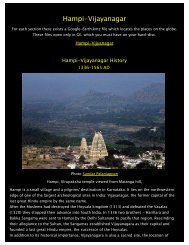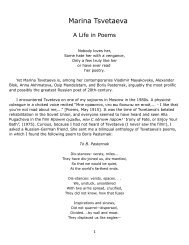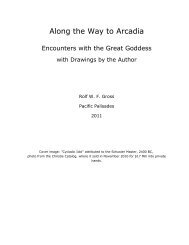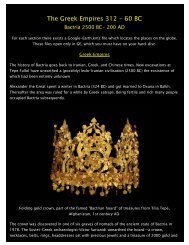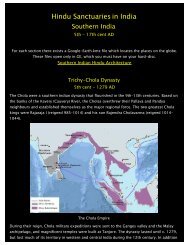except for a couple, kissing in the dark! Not far from this place, on a s<strong>and</strong>y flat next to a lake—a cinema! A hummingprojector, an improvised screen, a dozen people on rickety chairs under the open sky. We were speechless.George discovered the restaurant. Nothing but shrimp! Mountains of red shrimp, briefly cooked, with everything on,heads, legs, feelers, hair. George pulled off the head of one, pried the meat out <strong>and</strong> ate it, as if he had done this all hislife. Wei-ji applauded, <strong>and</strong> I shook my head. And then it turned out that George as a child used to fish for crayfish in thesummer in the Mingrelian streams! "We ate them raw!" And why had he made such a fuss about eating shrimp inPeking?He laughs. "Remember, I ate them with gusto! I did not know that shrimp looked like pink worms when one cooks thempeeled. Where is the wine? They must be washed down with a glass of wine!"The restaurant owner sent his boy out, who returned with three bottles of a heavy sweetish white wine. By midnight wehad eaten three buckets of shrimp <strong>and</strong> drunk all the wine.Our visit to Putuo Shan Dao began with a tipsy night.The morning was sunny, the world in new colors. The village did look like it was from southern France. The lake wherethe films had been shown turned out to be full of fat red <strong>and</strong> golden carps, the sacred pond of the monastery to which leda zigzag footbridge, to confuse the ghosts who can only run straight!A yellow-washed wall surrounded the monastery complex. The man-high character "fo" for Buddha painted in blackstrokes on the wall. It consists of the sign for "self" crossed by two vertical strokes, "the man with no self." The mainmeditation hall towered, slightly elevated at the center surrounded by small buildings, living quarters, a kitchen, prayerhalls with Buddhist images. Everything very simple. Ancient Ginkgo trees gave shade. A rain of golden leaves fell ontothe cobblestones. Like in the fairy tale I filled my pockets with the sacred gold.From the meditation hall came the muffled booms of a heavy drum, above it the chant of a Sutra reading. After every linethe jingle of a bell. At the end of a verse a great gong.The monks wore ash-gray linen jackets <strong>and</strong> long pants buttoned at the bottom, shaven heads, many young neophytes,intelligent-looking older monks.Through a side entrance I stole into the meditation hall <strong>and</strong> surprised two novices in an intimate conversation, gesturingh<strong>and</strong>s. Startled, they dashed off. The sound of the big drum filled the hall, resonated in my chest. Under the loweredgaze of a colossal, seated Buddha two rows of monks recited a Sutra. Throughout the room knelt pilgrims on smallcushions. Every time the gong sounded they bowed, touching the bare stone floor with their foreheads.I seated myself in the farthest corner on an empty cushion <strong>and</strong> ab<strong>and</strong>oned myself to the sound of the drum <strong>and</strong> thechanting. Then I got on my knees <strong>and</strong> joined in the bowing. I discovered that the bending down presses the air out ofone’s lungs. One has only to lose oneself entirely to this rhythm, then this becomes an effective meditation exerciseaccessible to anyone. The pilgrims mechanically repeated a formula which I did not underst<strong>and</strong>.When I found Wei-ji <strong>and</strong> George they were having a glass of wine in the village tavern. George laughed, he had fearedthat I had gone straight to nirvana. They were discussing my cremation, hoping that the incineration of my mortalremains would free the world of my restless foreign spirit (gui-hu) <strong>and</strong> I would no longer threaten my friends’ sense ofreality. Wei-ji exploded in a peal of laughter. I must have looked nonplussed. But I could underst<strong>and</strong> these two soullessmaterialists, they were bored.In the afternoon we decided to climb the mountain. On our way we passed a nunnery with an over-life-sized recliningBuddha in Paranirvana, the death of the historical Buddha Gautama. The nuns had shaven heads <strong>and</strong> wore noheadgear. Strange, how similar men <strong>and</strong> women look without hair.The path to the top of the isl<strong>and</strong> mountain climbed straight up the steepest slope, by way of stairs! It was hot <strong>and</strong> humid.We passed two young girls in heavy clothing who threw themselves on the stairs, got up <strong>and</strong> two steps onwards threwthemselves down again. In the heat of noon!Wei-ji could not hide her disgust. She said guardedly. "Mr. <strong>Konrad</strong>, these are Tibetan girls, aren’t they embarrassing? NoChinese would make a show of his emotions like that." I was overcome by contradictory feelings. The surprise of seeingTibetans for the first time, compassion with their devout prostrations, annoyance with Wei-ji’s Chinese arrogance—<strong>and</strong>the eminently sensible Confucian insight that man should leave religion to the clerics who specialize in such things. I amafraid it will cost me some time to resolve these contradictions in my mind.At the top of the mountain opened a panoramic view across numerous isl<strong>and</strong>s <strong>and</strong> the open yellow sea, <strong>and</strong> then Idiscovered that the flags on the mast—squares of colored cloth frayed by wind <strong>and</strong> weather—were densely printed withTibetan letters, prayer flags, so far from the L<strong>and</strong> of the White Clouds!Exhausted <strong>and</strong> thirsty, we asked for a cup of tea in a monastery which cowered, protected from the wind, in a hollow onthe far side of the mountain. The brother doorkeeper produced an intelligent-looking monk of my age who introducedhimself in English as the abbot <strong>and</strong> inquired after our wishes.Over a cup of tea, its leaves swimming—one strains them with one’s teeth—I collected my courage <strong>and</strong> asked the abbotfor the history of early Ch'an.In contrast to the Sufi, the Chinese have a very pronounced sense for history. The abbot gave us a brief description ofthis Chinese variant of Buddhism. Bodhidharma, the mythical founder, came to China from southern India in the sixth176
century. The characteristic Chinese form evolved a hundred years later. By the thirteenth century Ch'an had displaced allother schools of Buddhism in China. In this period it must have reached the Sufi in Turkestan.To my question, what are the specific methods <strong>and</strong> doctrines of Ch'an, the man was silent. Eventually he smiled. "Iassume, that you know nothing about Ch'an or its Japanese variant Zen?"I nodded."Well, Ch'an uses averbal <strong>and</strong> arational methods, which one can practice, but which defy description in words... Ch'anreduced the complex <strong>and</strong> slow Indian meditational techniques, with which we search for enlightenment <strong>and</strong>underst<strong>and</strong>ing of ourselves, to their minimum essence. The methods of Ch'an are simple <strong>and</strong> practical: sit before a wall<strong>and</strong> count your breath. After some years of this meditation you will have a sudden experience of enlightenedunderst<strong>and</strong>ing. To speed up this process, the teacher occasionally gives his student a puzzle question, a conundrum tomeditate on, which does not have a verbal solution. It is supposed to teach the student that life is not rationallycomprehensible. The last step of Ch'an teaching does away with all words."He took a piece of paper <strong>and</strong> a brush. "One typical answer to your question about the essence of Ch'an is this."With a single movement of his wrist he drew a perfect ling on the paper.The abbot smiled at me expectantly, picked up his cup, <strong>and</strong> took a sip of tea.I felt an irresistible temptation to show off, asked for the brush, <strong>and</strong> with a lucky h<strong>and</strong> drew an equally perfect ling. Theman stared at me, amazed.Proud that I had successfully surprised him, I did not notice what happened next until it had happened. The abbot madean involuntary movement with his h<strong>and</strong> <strong>and</strong> spilled his tea over my ling.I was speechless.And then I understood. Complete spontaneity is the way to all insight.Slowly a smile went over the man’s face that turned into unrestrained laughter. He rose, <strong>and</strong> in an entirely un-Chineseoutburst of joy slapped me on the shoulder.How is it possible that I have never understood that you, my extraordinary challenge, have been trying to teach me thisinsight for twelve years...?We shall sail from Shanghai in three days. We shall arrive in Batumi in the first week of February, I want to spend a weekwith Irakli <strong>and</strong> Tamunia-Deda <strong>and</strong> be home by the middle of February. I shall finally hold you in my arms again.Be well until then.Your longing husb<strong>and</strong>,<strong>Konrad</strong>The whole family awaited the long-lost husb<strong>and</strong>, father, <strong>and</strong> brother-in-law with flowers, hugs, <strong>and</strong> kisses at the railwaystation. This time little Sophia rode on <strong>Konrad</strong>’s shoulders, while Otto walked next to him talking about his rides withUncle Niko <strong>and</strong> <strong>Konrad</strong>’s adventures in Samark<strong>and</strong>.At home <strong>Konrad</strong> opened his valise <strong>and</strong> spread his presents. Five lengths of magnificent printed silks, one a shade of lightgreen that grew darker towards the bottom where a b<strong>and</strong> of stylized field flowers bloomed in all colors. A yellow pilgrim’sbag stamped with the large red woodprints the monasteries of Putuo Shan Dao. A box of ivory chopsticks imprinted withChinese characters for all to try. A precious ink-stone for his calligraphy. Two necklaces of enameled beads <strong>and</strong> astrange yellow mask with a beaked snout <strong>and</strong> the big teeth of a monkey."What is this, Daddy?" asked Otto taken aback.<strong>Konrad</strong> laughed. "The mask of the Monkey King, Wang Hou, who invented grammar <strong>and</strong> came to China as the emissaryof the Buddha. These days he is the beloved acrobatic joker of the Chinese Opera. Let me show you."<strong>Konrad</strong> dug a thick, battered sketchbook from the bottom of his luggage. "See," he showed one of the drawings to Otto,"here is a scene from the opera, <strong>and</strong> there is the Monkey King making a somersault before the bearded King <strong>and</strong> hisladies."Alex<strong>and</strong>ra looked over Otto’s shoulder. "Did you do these drawings?""Yes," <strong>Konrad</strong> said happily. "I discovered that I could still draw. I used to sketch at school. You have seen me draw theflowers I collected?"Alex<strong>and</strong>ra put the volume on the table <strong>and</strong> leafed through it. His entire journey in pictures! Turbaned men at theRegistran in Samark<strong>and</strong>, the shores of Lake Baikal, Peiking, the Gardens of Suchow, <strong>and</strong> George gorging himself onshrimp on Putuo Shan Isl<strong>and</strong>. She embraced him <strong>and</strong> gave him a big kiss.Otto had disappeared <strong>and</strong> now returned with a large map of <strong>Konrad</strong>’s journey, which he had drawn. They spread themap <strong>and</strong> <strong>Konrad</strong>, full of admiration for Otto’s work, pointed at the places where the sketches came from.Meanwhile Niko had put on the monkey mask <strong>and</strong> was jumping around the room flailing his arms. He sank on his kneesbefore <strong>Konrad</strong> laughing. "Welcome home Mepo <strong>Konrad</strong>i!""The mask brings out the underused Georgian theatrical talents in you, Herr Physicist," joked <strong>Konrad</strong>. "But can you alsodo somersaults?""Your furniture is in the way. Give me a bigger stage!" Niko retorted <strong>and</strong> made a headst<strong>and</strong> wiggling his feet.177
- Page 3 and 4:
Table of Contents1. My Grandfather'
- Page 5 and 6:
1.My Grandfather's Watch among the
- Page 7 and 8:
ditch beside the road.Mother was tr
- Page 9 and 10:
Deep snow still covered Djvari Pass
- Page 11 and 12:
"But you know nothing about how to
- Page 13 and 14:
newborn baby! You won’t need a ba
- Page 15 and 16:
Dadiani bent over the table, reache
- Page 17 and 18:
Autumn had come to Georgia, and it
- Page 19 and 20:
"Gespenstisch!" whispered Mouravi t
- Page 21 and 22:
Finally, depressed by his inability
- Page 23 and 24:
They slowly rode up the hill north
- Page 25 and 26:
On their way back to the Lavra Alex
- Page 27 and 28:
Blushing like a young girl, she gav
- Page 29 and 30:
Alexandra bowed deeply to a middle-
- Page 31 and 32:
All applauded and Ilia made a small
- Page 33 and 34:
She had done her hair up in a new w
- Page 35 and 36:
ape her. But then he must die, and
- Page 37 and 38:
a rear door when she entered.If Per
- Page 39 and 40:
Alexandra went purple with embarras
- Page 41 and 42:
The smell of roasting lamb wafted t
- Page 43 and 44:
Konrad quietly sat back. To his gre
- Page 45 and 46:
The tall, dark-haired woman began w
- Page 47 and 48:
She kissed him."Maybe you dream of
- Page 49 and 50:
14.Tuscany - the Wolfsons' House in
- Page 51 and 52:
ut are, unjustly, much more famous.
- Page 53 and 54:
Alexandra had fallen into melanchol
- Page 55 and 56:
She kissed him tenderly. "Niko, I a
- Page 57 and 58:
obligations, and she, ever since th
- Page 59 and 60:
months, was flooded with the diffus
- Page 61 and 62:
could they be aroused into communal
- Page 63 and 64:
19.An unexpected encounter with Vla
- Page 65 and 66:
chauffeur drop me at the station ju
- Page 67 and 68:
She described her sensation of flyi
- Page 69 and 70:
sky a thin, transparent blue. Imbed
- Page 71 and 72:
interest in Theosophy."Marti shrugg
- Page 73 and 74:
to?Mother had never mentioned any d
- Page 75 and 76:
"Ah, of course, of course, ‘Eine
- Page 77 and 78:
Konrad agreed that this sounded mor
- Page 79 and 80:
patriarchal oak and smiled, a littl
- Page 81 and 82:
have a similar situation in our vil
- Page 83 and 84:
Alexandra disagreed. "Most abortive
- Page 85 and 86:
a limited edition, hand-screened ma
- Page 87 and 88:
Alexandra touched her necklace and
- Page 89 and 90:
close!"She had hugged him, tears ru
- Page 91 and 92:
The others came lumbering up the st
- Page 93 and 94:
urden the heart with this task, whi
- Page 95 and 96:
the colors mixed and changed depend
- Page 97 and 98:
28.Kandinsky's suprising confession
- Page 99 and 100:
With kisses Alexandra removed the v
- Page 101 and 102:
He knelt, removed her knee and leg
- Page 103 and 104:
Joachim viewed Konrad with sympathe
- Page 105 and 106:
The rumbling continued at regular i
- Page 107 and 108:
Russia."She picked up a piece of br
- Page 109 and 110:
conservative pessimism, demanded th
- Page 111 and 112:
preventative method and taking it e
- Page 113 and 114:
new provocation in modern music and
- Page 115 and 116:
exhausted the Renaissance idea of b
- Page 117 and 118:
creative clairvoyance, and her shar
- Page 119 and 120:
Left to herself, Alexandra, awed, w
- Page 121 and 122:
public. She fended off the fuzzy wo
- Page 123 and 124:
ailways on strike. The strike had t
- Page 125 and 126: Grandfather was very sad when he fo
- Page 127 and 128: and put on his coat and shoes, he r
- Page 129 and 130: Alexandra not in the mood to give V
- Page 131 and 132: crowd of the fashionable and the ma
- Page 133 and 134: established tradition with some mil
- Page 135 and 136: 42.Uncle Muravi's Benz, Tiflis1907"
- Page 137 and 138: equisitioned a locomotive to take t
- Page 139 and 140: meaningless rituals. That may be on
- Page 141 and 142: lacking. I like this man, and at th
- Page 143 and 144: are suitably ambiguous."45.The Dadi
- Page 145 and 146: think of Munich or something else p
- Page 147 and 148: He showed them the room where they
- Page 149 and 150: death."Alexandra was more intereste
- Page 151 and 152: they fought over the offering. The
- Page 153 and 154: flew off cawing.Claudia grabbed Ale
- Page 155 and 156: Together they were hedging out a pl
- Page 157 and 158: the right of women to own their bod
- Page 159 and 160: The Chinese wife of a sinologist at
- Page 161 and 162: these texts."However, Ch'an is the
- Page 163 and 164: times, but moved back together agai
- Page 165 and 166: survived the Bolsheviks, the Fascis
- Page 167 and 168: physically overwhelm her. Despite h
- Page 169 and 170: Konrad picked up Alexandra at the t
- Page 171 and 172: Abruptly her vision had narrowed, a
- Page 173 and 174: the Kwadjagani, the Masters of Wisd
- Page 175: somewhat, his back was still bent,
- Page 179 and 180: Alexandra was relieved and happy, a
- Page 181 and 182: subconscious past her observant min
- Page 183 and 184: Dahl leaned back in surprise. "This
- Page 185 and 186: visions reappear. Entire armies mar
- Page 187 and 188: "This method is not easy, I have ne
- Page 189 and 190: He had started with representationa
- Page 191 and 192: His hair had turned completely whit
- Page 193 and 194: Overnight the mood in St. Petersbur
- Page 195 and 196: daughter. His wife had left him no
- Page 197 and 198: which was presented to him—with a
- Page 199 and 200: "From the soldiers whom I took care
- Page 201 and 202: He watched Alexandra’s doubting m
- Page 203 and 204: lond, bony girl whose gray eyes loo
- Page 205 and 206: call it intellectual humanism. It d
- Page 207 and 208: time I asked this question I had me
- Page 209 and 210: "I spent most of the winter of 1918
- Page 211 and 212: We buried him in the cemetery at G
- Page 213 and 214: ways. Corruption became the way of
- Page 215 and 216: 68.A Concert in Kreuth - Eliso1989I
- Page 217 and 218: Eliso listened with increasing fasc


